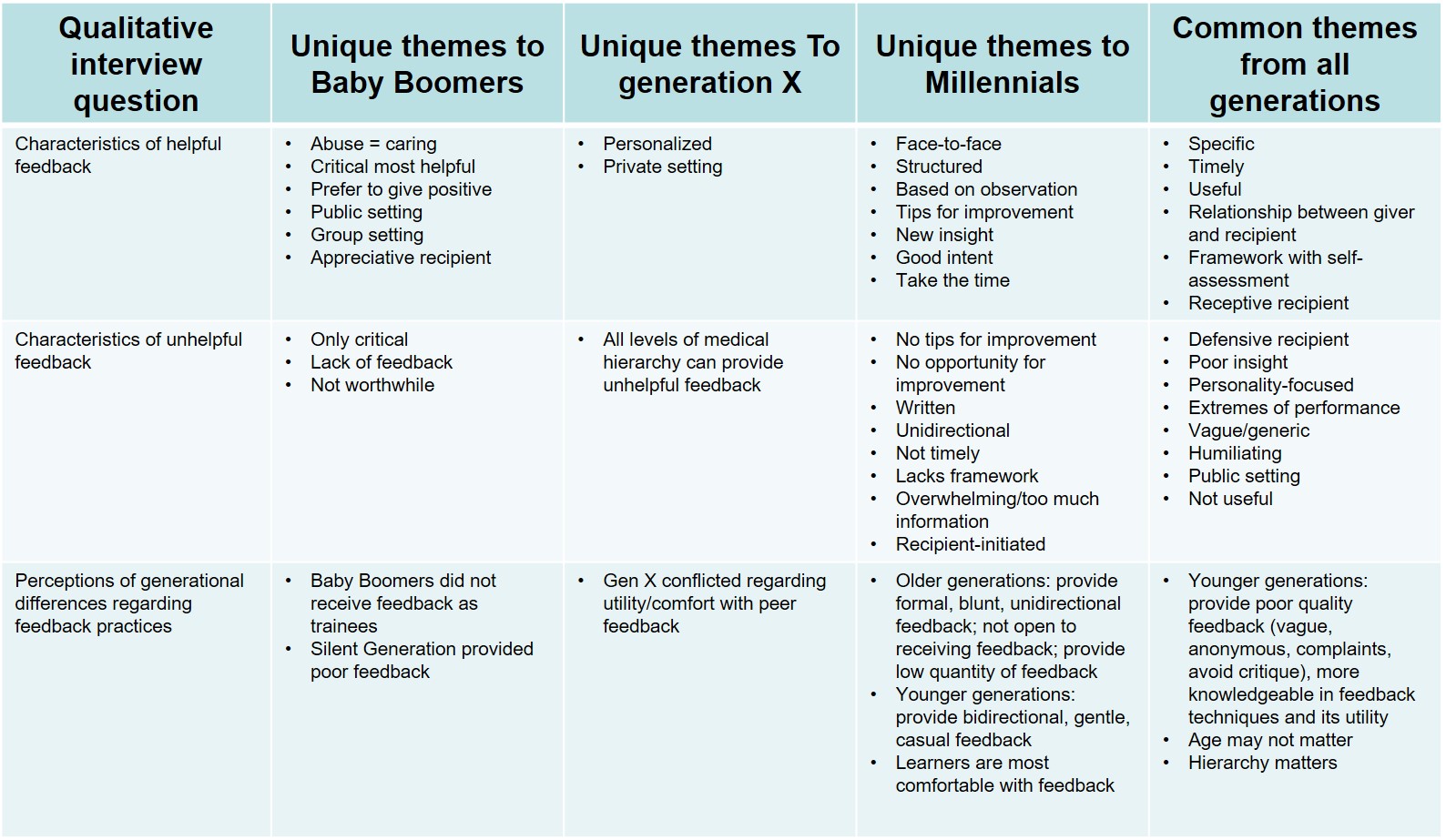Back
Medical Education: Professional Educator
Category: Abstract Submission
Medical Education 7 - Medical Education: Potpourri
150 - Feedback In Medical Education: Themes By Generational Cohort
Saturday, April 23, 2022
3:30 PM – 6:00 PM US MT
Poster Number: 150
Publication Number: 150.218
Publication Number: 150.218
Maria J. Skorey, Medical College of Wisconsin, Brookfield, WI, United States; David Lambert, Washington University in St. Louis School of Medicine, St. Louis, MO, United States; Kris Saudek, Medical College of Wisconsin, Milwaukee, WI, United States

Maria J. Skorey, MD
Neonatology Fellow, PGY-6
Medical College of Wisconsin
Brookfield, Wisconsin, United States
Presenting Author(s)
Background: Feedback is a required part of medical training, yet literature indicates trainees do not get enough high-quality feedback. Generational theory identifies different priorities, characteristics, and expectations among different generations (e.g., Baby Boomer, Millennial), and these differences may apply to feedback. If generational differences are better defined, medical educators can implement strategies to improve feedback practices.
Objective: To examine feedback practices and preferences to determine if differences exist among generational cohorts.
Design/Methods: Qualitative interview questions were developed through iterative review by medical education experts for content and face validity (Table 1). An invitation to participate was sent to 1057 respondents including medical students in their M3 or M4 year, and house officers and attending physicians in pediatrics, internal medicine, and surgery at a single healthcare institution. Exclusion criteria included non-English speaking persons and foreign medical graduates. Participants completed eligibility and demographic surveys. Qualitative empathy interviews were conducted via Zoom, audio-recorded and transcribed, with subjects deidentified. Interviewers and participants were intentionally paired to avoid evaluative relationships. The interviews underwent inductive analysis for coding. Interviews stopped when thematic saturation was reached. Qualitative data was stratified primarily by generational cohort.
Results: We conducted 35 interviews. Participants’ birth years spanned between 1949-1994, including Baby Boomers (23%), Generation X (14%), and Millennials (63%). The majority of participants were pediatricians (65%). Among attending physicians, years in practice ranged from less than 1 year to over 21 years. We identified unique perspectives from each generation and commonalities shared by all generations (Table 2). Key themes included the importance of relationship and the effect of medical hierarchy. Most interviewees did not believe that age matters in feedback practices, but perceptions of generational differences did exist. When asked about the purpose of feedback respondents universally shared that it is to help one improve.Conclusion(s): Generational cohorts expressed different practices and preferences regarding feedback. Areas they shared similarities are considered hallmarks of effective feedback practices. Strategies to foster relationships and address medical hierarchy may improve feedback practices. Experience and hierarchy were confounders when addressing age and generation. Further studies should address these confounders.
Maria Skorey CVSkorey CV.pdf
Table 2. Sample of themes per generational cohort: unique themes per generation and common themes shared by all generations
Objective: To examine feedback practices and preferences to determine if differences exist among generational cohorts.
Design/Methods: Qualitative interview questions were developed through iterative review by medical education experts for content and face validity (Table 1). An invitation to participate was sent to 1057 respondents including medical students in their M3 or M4 year, and house officers and attending physicians in pediatrics, internal medicine, and surgery at a single healthcare institution. Exclusion criteria included non-English speaking persons and foreign medical graduates. Participants completed eligibility and demographic surveys. Qualitative empathy interviews were conducted via Zoom, audio-recorded and transcribed, with subjects deidentified. Interviewers and participants were intentionally paired to avoid evaluative relationships. The interviews underwent inductive analysis for coding. Interviews stopped when thematic saturation was reached. Qualitative data was stratified primarily by generational cohort.
Results: We conducted 35 interviews. Participants’ birth years spanned between 1949-1994, including Baby Boomers (23%), Generation X (14%), and Millennials (63%). The majority of participants were pediatricians (65%). Among attending physicians, years in practice ranged from less than 1 year to over 21 years. We identified unique perspectives from each generation and commonalities shared by all generations (Table 2). Key themes included the importance of relationship and the effect of medical hierarchy. Most interviewees did not believe that age matters in feedback practices, but perceptions of generational differences did exist. When asked about the purpose of feedback respondents universally shared that it is to help one improve.Conclusion(s): Generational cohorts expressed different practices and preferences regarding feedback. Areas they shared similarities are considered hallmarks of effective feedback practices. Strategies to foster relationships and address medical hierarchy may improve feedback practices. Experience and hierarchy were confounders when addressing age and generation. Further studies should address these confounders.
Maria Skorey CVSkorey CV.pdf
Table 2. Sample of themes per generational cohort: unique themes per generation and common themes shared by all generations

